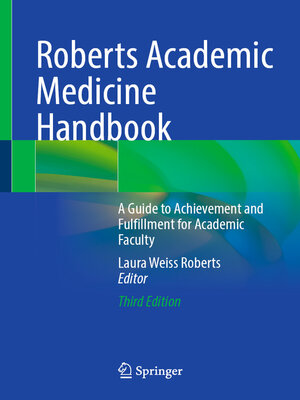Roberts Academic Medicine Handbook
ebook ∣ A Guide to Achievement and Fulfillment for Academic Faculty · Medicine
By Laura Weiss Roberts

Sign up to save your library
With an OverDrive account, you can save your favorite libraries for at-a-glance information about availability. Find out more about OverDrive accounts.
Find this title in Libby, the library reading app by OverDrive.



Search for a digital library with this title
Title found at these libraries:
| Library Name | Distance |
|---|---|
| Loading... |
This third edition has been fully updated and expanded, including seventy-three chapters, a dozen of which are new, to support the professional development and success of faculty in the field of academic medicine. Previous editions of Roberts Academic Medical Handbook are regarded as gold-standard resources that guide health professionals, including clinicians, scientists, and learners, in navigating their careers in academic medicine.
Section One covers the critical topic of approaching the path of academic medicine, with emphasis on how to build your foundation for a successful career. This section includes two new chapters on contemporary issues faced by new professionals: how to avoid imposter syndrome and how to stay focused. Section Two builds upon this foundation and includes three new practical chapters that will relay to the reader how to craft an effective personal statement, teach in busy clinical settings, and approach board certification and recertification. Section Three examines best practices for working well and effectively with colleagues and includes a new chapter on how to be one’s best self-advocate in academic settings. Following this, Section Four offers constructive guidance on key competencies for academic faculty, such as preparing book proposals, writing manuscripts, and reviewing manuscripts. Section Five discusses how to conduct empirical studies and includes a new chapter on how to approach medical education research. Section Six includes chapters on developing administrative skills, including best practices in faculty searches and how to work collaboratively with human resources. The book closes with a final section that discusses advancing your career and work-life balance, featuring three new chapters.
Roberts Academic Medicine Handbook, 3rd Edition will be an indispensable resource for all professionals entering the field or mentoring others who are seeking fulfillment through a career in academic medicine.







